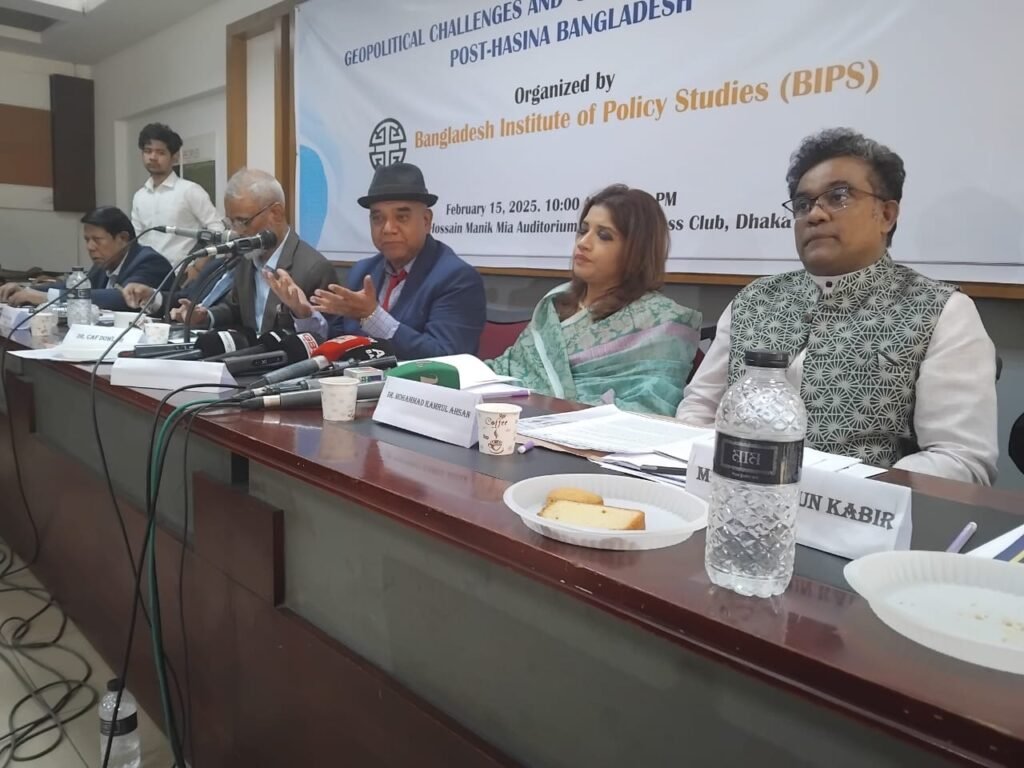
Ladies and Gentlemen:
Welcome to the seminar on “Geopolitical Challenges and Strategic Imperatives for Post-Hasina Bangladesh,” organized by the Bangladesh Institute of Policy Studies (BIPS). BIPS is an independent, nonprofit think tank, dedicated to advancing democratic governance and market-driven economic policies. We seek to emerge as a hub of intellectual excellence to spearhead transformative change through the formulation of pragmatic and forward-looking public policies aimed at strengthening economic resilience, financial stability, educational advancement, legal, judicial, and political reforms aimed at transforming Bangladesh into an upper-income democratic nation in the foreseeable future.
This is the second seminar of BIPS. Our first seminar on “Constitutional Reforms for Transition to Democratic Governance,” was held at the CIRDAP Auditorium on October 19, 2024. The event brought together several Supreme Court justices, over three dozen advocates, and prominent journalists. Notably, many of the proposals discussed—such as the introduction of judicial reforms, bicameral parliament, and the reform of key governmental institutions before holding elections—seem to have gained the attention of policymakers.
Geopolitical Challenges for Post-Hasina Bangladesh
The most pressing challenges facing policymakers in the wake of the collapse of the Hasina regime involves three major issues, such as thorough realignment of foreign policy diversifying Bangladesh’s overwhelming dependence of India. Under Sheikh Hasina regime, Bangladesh maintained close ties with India, promoting extensive cooperation in trade, physical and digital connectivity, and national security. Such overwhelming reliance on India is like placing all eggs in one basket. Hasina also granted transit facilities to India through Bangladesh, still India’s relations with Bangladesh was marked by concerns over unequal water-sharing agreements, border killings, and trade imbalances.
Second, Bangladesh must recalibrate relations with China as its seeks to expand relations with the country through the Belt and Road Initiative (BRI), financing infrastructure projects, and deepening trade relations. But, relations with China presents a paradox—if Bangladesh moves closer to India and the West, China may respond by exerting economic pressure or reducing investments. Conversely, if Bangladesh leans toward Beijing, India and its Western allies might react unfavorably, complicating Bangladesh’s diplomatic position.
Third, Bangladesh should also maintain very careful policies in respect to United States. The main interest of the US is to see that human rights are respected; democratic system is prevailed and elections are held in free and fair manner. The challenge for Bangladesh is to align with Western interests without alienating its regional neighbors, and deal with the US keeping in mind that Bangladesh must not jeopardize its trade relations, access to the US market and preferential trade benefits with the US.
Regional Stability and Rohingya Crisis
A major unresolved issue for Bangladesh is the decades-old Rohingya refugee crisis, which remains a geopolitical flashpoint. Hasina’s government struggled to negotiate repatriation agreements with Myanmar. Myanmar’s military junta may test resolve of post-Hasina governments, which may potentially lead to increased tensions along the border. Furthermore, Bangladesh’s relations with ASEAN nations and the United Nations could be affected by any changes in policy toward the refugee situation.
Internal Political Instability and Economic Challenges
Internal instability following Hasina’s departure could create further vulnerabilities. A fractured political environment, with various parties and factions vying for power, differing stances on election and reforms, might reduce Bangladesh’s ability to engage effectively with global and regional players. Economic uncertainty, including capital flight, and reduced investor confidence, could further complicate diplomatic negotiations and strategic partnerships. The ability of the post-Hasina governments to navigate these complexities will determine Bangladesh’s position on the global stage and its long-term national security and economic prosperity.

